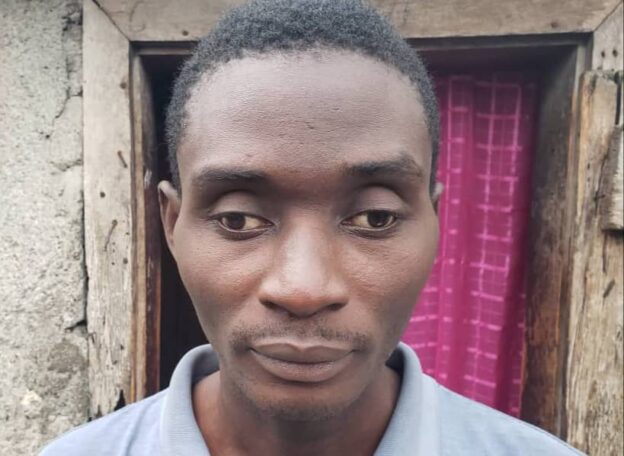Jean Tanisma lives with his mother in Fon Ibo, a densely populated area not far from downtown Gwomòn. The CLM team was searching for new program members in Fon Ibo in early 2017, and they were lucky to come across Jean. He hadn’t been mentioned by his neighbors at the community meeting that opens the selection process. But Gissaint César, who was then the brand new supervisor in change of CLM in Gwomòn, was interviewing Jean’s niece, who was a potential program participant. He saw Jean and started asking about him.
Fonkoze rarely takes men in the program, and it rarely takes anyone who has no dependent children. But since 2016, it has included individuals with disabilities, as long as they are poor enough to qualify, and Jean clearly was. He went blind as a teenager. At the time he joined the program, he was 32 and entirely dependent on his mother, who was herself very poor. He had no economic activity of his own. The two sometimes went an day without a meal.
Like many of the members in Fon Ibo, Jean chose goats and a pig as his economic activities, and the program bought him two goats and a pig. But the goats did poorly. He couldn’t keep them healthy, so they didn’t reproduce. He finally gave up on them, selling them off to buy a sheep, but the sheep didn’t do much better.
Fon Ibo turned out to be a bad place to raise animals that graze. It’s densely populated, and the small spaces that aren’t covered with houses and their surrounding yards are thickly planted. The area is also fertile, and folks are very reasonably sensitive about their gardens. Few of the families in the neighborhood who chose goats made much progress with them. The couple of exceptions involved exceptional circumstances, like an unusually large yard or a partner willing to lead the goats to distant plots he was farming every day.
Jean’s pig was another story. He gave it careful attention, raising it and successive litters of piglets in a back corner of his mother’s yard. Because it was right in his yard, he was able to take care of it himself, rather than depending on helpers who were willing, but not always reliable. He bought the feed it needed. It was a lot of work, but he was happy to have something useful to do. When each litter was ready, he sold it off and deposited the money in his account at Fonkoze.
But earning money in occasional lumps when he sold some pigs would present challenges that Gissaint helped Jean see. Like all the CLM members who joined with him, Jean was part of a Village Savings and Loan Association, and membership required him to have at least 100 gourds to buy shares with at weekly meetings That might not seem like much. At the time is was just about $1.50. But it was more than Jean could count on having every week.
Gissaint told Jean that the best thing he could do would be to establish a small commerce. Even a very small one could help him make his weekly contributions, even if his pigs remained his principal source of income. So Jean decided he would take the advice, and started thinking about what he might sell.
The idea he came up with was very good. He took some money out of his bank account, and bought pig feed. And he has kept up that business ever since. He buys it by the sack, and sells it by the cup or can. It’s not very profitable, but it makes him enough to contribute to his savings group, and allows him to keep his own pigs fed as well. He also can give his mother the money she needs to feed herself and him.
He can’t make sales without help. He can’t see well enough to distinguish denominations of bills. But finding people to help him out has never been his problem. Others simply act as his cashiers.
From Jean’s perspective, the change in his life has been monumental. “It makes me so proud when I reach into my own pocket to buy something I want. And to know that if I need 5,000 or 10,000 gourds, I can lay my hands on it.”
Jean has a plan for the current litter of piglets. He plans to sell all but one female. That will give him two sows, which will double the size of his operation. He’ll put the rest of the money in his Fonkoze account. He’s saving to buy a cow. He’s not sure what he will do with the cow, but he sees it as the next step forward. “When you start at the bottom, you have to think bigger and bigger, one step at a time.”
